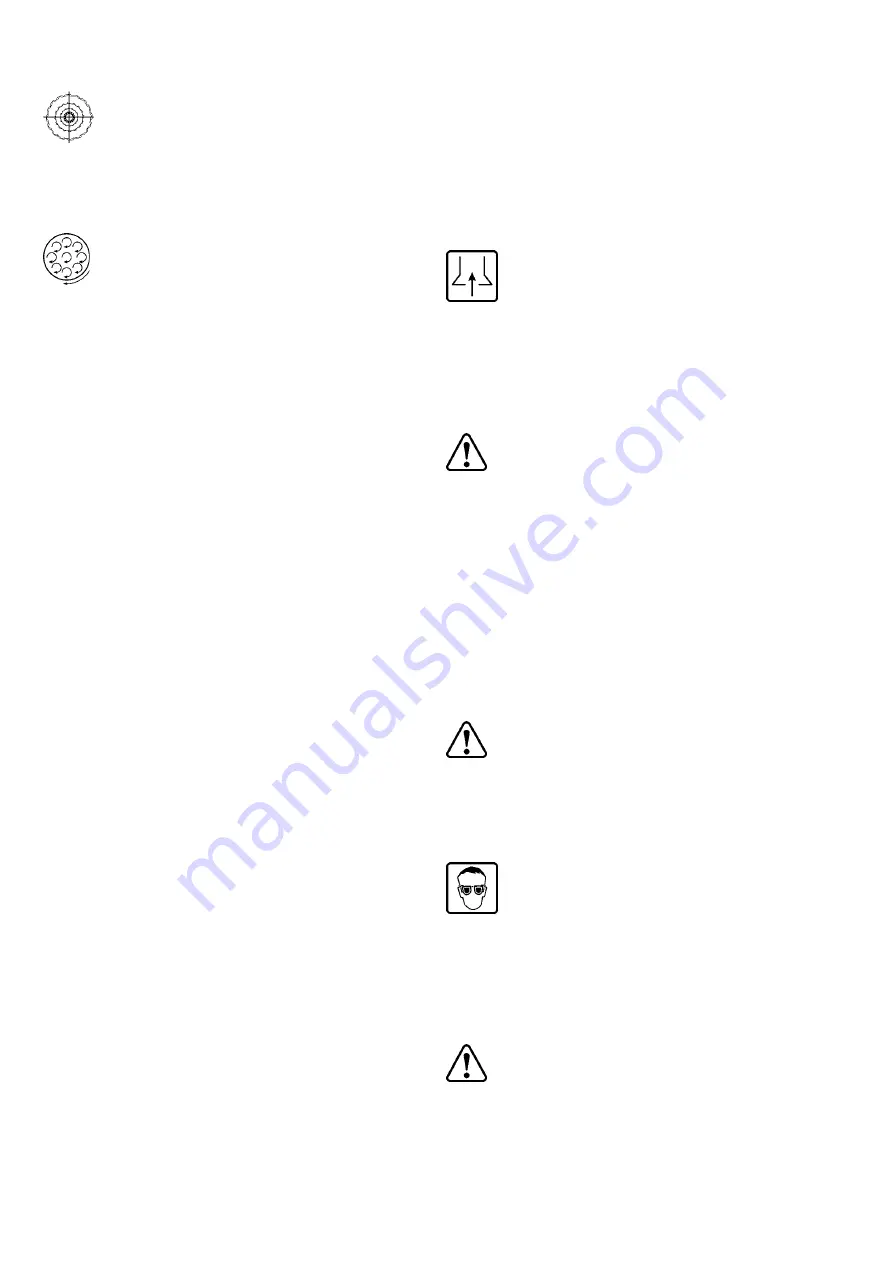
8
Rotex rotary motion (coarse sanding,
polishing)
The Rotex rotary motion is a
combination of rotary and eccentric
motions. This position is selected for
sanding with high output (coarse
sanding) and polishing.
Slide the switch (1.1) into the right position.
Eccentric motion (fine sanding)
This position is selected for sanding
with low output for a scratch-free
surface (fine sanding).
Press the switch (1.1) downwards and push it
into the left-hand position.
5.2
Sanding pad brake
The rubber collar (3.1) prevents the sanding
pad from revving up to maximum speed in an
uncontrolled manner during eccentric motion
(fine sanding) .
Because the collar wears down in the course
of time, it has to be replaced by a new one
(order no. 453 388) as soon as there is any
reduction in the braking effect.
5.3
Choice and installation of the
sanding disks
Choise of sanding disk
The appliance can be fitted with three sanding
disks of different hardness depending on the
surface to be treated.
Hard:
coarse sanding on surfaces, sanding at
edges.
Soft:
universal for coarse and fine sanding for
flat and curved surfaces.
Super-soft:
fine sanding on formed parts,
curves, radii. Do not use on edges!
Assembly
The FastFix system enables tool-free
replacement of the sanding pad:
- Set the switch (1.1) to the right, to the Rotex
rotary motion
- Press the spindle stop (1.5)
- Turn the fitted sanding pad from the spindle
(right-handed thread)
- Keep the spindle stop pressed and screw on
the new sanding pad (in doing so, make sure
that the rubber collar (3.1) is correctly fitted!)
- let go of the spindle stop
Actuate the spindle stop only when the drive
spindle is stationary. Do not switch on the
motor when the spindle stop is pressed in.
5.4
Attaching sanding material
The appropriate Stickfix sanding paper and
Stickfix sanding felt can be fastened quickly and
easily onto the Stickfix sanding base.
The self-adhesive sanding material is simply
pressed onto the sanding base (1.7) and held
safely in place by the Stickfix sanding base
velcro surface. After use, the StickFix
sandpaper is simply pulled off.
5.5
Securing polishing attachments
To prevent damage, PoliStick polishing
attachments (sponges, felt, lambswool
bonnets) may only be used on the special
polishing pad that is fitted on the machine
instead of a sanding pad. In the same way as
the StickFix abrasives, the PoliStick polishing
attachments are simply pressed onto the
polishing pad and pulled off after use.
5.6
Dust extraction
Always connect the machine to a dust
extractor.
You can connect a Festool extractor with an
extractor hose diameter of 27 mm to the
extractor connector (1.4).
6
Working with the machine
Always secure the workpiece in such a
manner that it cannot move while being
sawed.
For safe guidance, hold the machine with one
hand on the motor housing (1.3) and one hand
on the gear head (1.8).
Never overload the tool by using too much
pressure! The best sanding results are achieved
when applying moderate pressure. The sanding
performance and quality depend mainly on the
choice of the right sanding material.
Tables A and B show the settings we
recommend for different sanding and polishing
work.
6.1
Metalworking
The following precautions are to be
taken when processing metals for
safety reasons:
- Pre-connect a residual current circuit-breaker.
- Connect the machine to a suitable dust
extractor.
- Clean tool regularly of dust accumulations in
the motor housing.
- Wear protective goggles.
7
Accessories, tools
For your own safety, use only original
Festool accessories and spare parts.
Festool offers the appropriate accessories,
sanding and polishing attachments for every
application.
The accessory and tool order number can be
found in the Festool catalogue or on the
Internet under www.festool.com.
Seen at Ideal Tools.
Содержание RO 125 EQ
Страница 2: ...Seen at Ideal Tools...

























